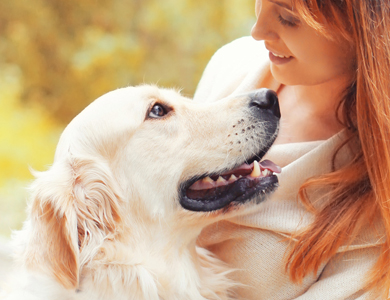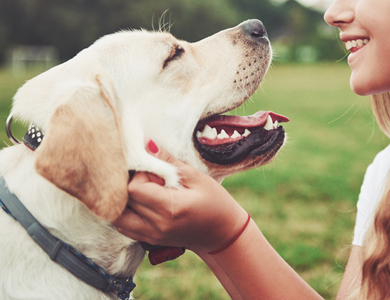Do you ever wonder what goes on in a dog’s mind? Does your dog, for example, sense when you’re feeling sad? Can it sense other emotions? You may also wonder whether your dog loves you. Let’s see what the latest research has to say on the topic.

Yes, your dog has emotions . . . but which ones?
Paul Ekman is a famous American psychologist who was a pioneer in the study of emotions and facial expressions. Thanks to his research, we know that humans are able to clearly express six basic emotions (happiness, sadness, anger, disgust, fear and surprise) through facial expressions.
Regardless of our origins, specific characteristics or age, we are able to demonstrate and recognize these basic emotions. We also know that dogs are able to demonstrate those same six emotions. After all, it’s easy to tell whether a dog is happy or sad from its facial expression.

Do dogs feel emotions the way we do?
Fortunately, our education methods and understanding of dog psychology are constantly changing, allowing us to ask questions that we would never have asked before.
A very interesting study by a group from Emory University in Atlanta, Georgia, focuses on the different areas of the brain to determine whether dogs can sense emotions. A group of dogs was trained using positive reinforcement so that the areas of their brains could be analyzed using MRI (magnetic resonance imaging).
The dogs in this study were also trained to recognize the hand signals that a team member gave the dogs when they were in the scanner. One of the hand signals meant “reward” and the other, “no reward.” The data collected showed that the area of the dog’s brain that responds corresponds to the same part of the human brain that responds to rewards such as money, food or music, for example.

What is anthropomorphism?
Anthropomorphism is the often misguided tendency to attribute human emotions to dogs to explain certain animal behaviours and attitudes. Unfortunately, we cannot access a dog’s black box, and it is difficult to find an explanation to justify inappropriate behaviour.
For example, we mistakenly believe that when our dog destroys a cushion or urinates by the front door, it is taking revenge on us for leaving. The dog feels a basic emotion such as fear, and its behaviours help manage this emotion. It has never been conclusively demonstrated that dogs feel vengeful. The same is true of jealousy. There are no studies that have shown these emotions in dogs.

Can dogs read our emotions?
The University of Lincoln in the UK studied dogs’ ability to read our emotions. We already know that our face is not completely symmetrical and that the left side is more demonstrative. That is why we naturally look towards the left side of a face. This phenomenon can also be observed in dogs looking at humans.
What is fascinating about this study is that dogs’ tendency to look towards the left side of the face applies only to humans. Dogs do not do this with objects or other animals. It is therefore likely that they developed this ability to better read our emotions.
Do our dogs love us?
Dogs have the same hormones as humans to manage their emotions. Abazu University in Japan studies oxytocin, often referred to as the love hormone. Using MRI, the study clearly shows that the hormone is activated during vocal or visual interactions with the owner of the dog in question.
There is undoubtedly a profound connection between dogs and their owners, but we need to define the concept of love to determine whether our dogs really love us. One thing’s for sure: owners hold a special place in their dogs’ hearts and minds!








